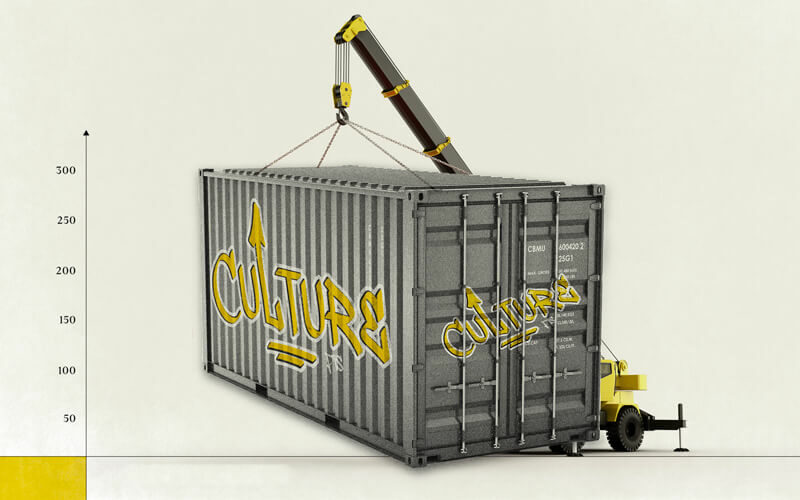Logistics experts Conor Hagan and Alex Ewart met in a freight forwarding warehouse, moving from colleagues to cofounders after 4 years of working together, and building their own software that gives ‘instant quotes, real-time track and trace, digital dashboards, and faultless workflow management’ for shipping anything (and we mean anything) around the globe.
Their growing success hinges on a simple philosophy on how they treat their customers and employees:
We’re still people, and they’re still people.
We talked to the team about how their personal and professional values helped build their founder-led culture.
Transparency
At Explorate HQ, transparency goes for internal as much as external stakeholders. Everyone is a part of development (literally) and growth, and the whole office gets involved in testing days for new ideas.
Business Operations Lead and OG team member Lyndsay Reyn explains that Explorate completely rejects the secretive, need-to-know mentality so many companies inexplicably stick to. Acting as though one department’s work is none of another’s business – AKA siloing – is a bizarre and unhelpful contradiction if you’re running, well, a business.
As a part of our quarterly KPIs, every team member – no matter what department they’re in – has the opportunity to come up with a new feature and go through that full development experience. The best ideas can come from unlikely places.
Education and communication
Explorate leadership is not fans of standups. A love-them-or-hate-them byproduct of remote team working, standups are often touted as a check-in when actually they’re a check-up.
“I find [standups] quite aggressive. There’s no human contact in ‘tell me 3 things you achieved today.'”
No dry training manuals or cheesy corporate training videos here either. Explorate looked for other, more inclusive ways of doing things.
For onboarding, Alex and Conor would do a “freight busters” thing where they dress up like the Mythbusters guys and give people unfamiliar with the industry a rundown on freight.
“At least 50% of our team isn’t doing anything freight related. They’re not selling freight. They don’t know what these acronyms mean. They don’t know why the port’s closed. But it’s crucial to talk about it and get that cross-team understanding.“
Problem-solving and support
Explorate’s founder-led culture arose in part out of adversity. The pandemic presented nothing short of a nightmare for logistics. A large percentage of Explorate’s outgoing calls are still relating to delays or increased costs. How do you keep staff happy in a business that often has to give bad news?
“We educate our staff on giving bad news. Freight is never good news. It’s very rare that we’re calling people with something fun and nice. I would say 70% of things have been delayed – there’s definitely been price increases. But we pick up the phone and tell people what’s going on. How we give them that news is probably vastly different to other companies. They can see our prices from the start of the booking until the end.“
Despite making several sprightly new dev hires (one of whom is now Chief Data Officer) over five years through a partnership with the Queensland University of Technology, the staff is a melting pot of varying ages. Explorate is disrupting a very old school industry, where some staff are used to archaic processes and interactions.
Balancing that with the tech is very challenging. We’re never going to have an app that doesn’t have human connection.
“We’ve implemented hot desks and people are in the office for three days and then at home or part time. So we think flexibility is obviously key.“
The same mentality applies to their social media use.
“Our customers are not coming in on Facebook or Instagram. We need to call old mate Bruce down at the Rocky Creek Hotel. And tell him we can get him a good price, and we’ll have him over for a BBQ (which we actually love doing).”
Lyndsey touches on something many companies are missing when it comes to social media marketing. It’s not a billboard – it’s a two-way street. It’s essentially a standin for in-person interactions. Users want to be engaged with; to be offered value and entertainment. A feed full of company announcements is never going to expand follower counts.
Ex-Facebook exec Molly Graham once said, “A founder saying something is like throwing a rock into a pond and watching the ripples. People immediately start repeating it. At Facebook, Mark would say something and the next day it would be on the walls.”
This is not so much a cautionary “be careful what you say”, but a reminder of the influence you have on your staff. Positivity breeds positivity.
The next challenge for Explorate is expanding the team from 35 people to 100+ across 4 new Australian offices within the next 12 months, maintaining the culture as they do so.
And they do have a blueprint for the rollout. Each office will be set up with a branch manager, a sales rep, and an ops manager. How each team is expanded will be assessed according to growth. This replicable mould of ‘mini teams’ allows the culture to start small, and be managed by the three original placements.
Kind of like how parents define their children, a company’s personality is defined by its founder(s). A competitive founder generates a competitive atmosphere. The crucial yet simple thing that shines out is that the Explorate founders are nice people. They care about their staff, they care about their customers, they find it rewarding to see both satisfied.
Environments like this allow healthy culture to naturally propagate.
But it’s not quite as simple as that. As we can tell from the back-to-work boom where employees worldwide are having to be dragged back into offices kicking and screaming, a shocking amount of founders and leaders are still getting things shockingly wrong.
Perhaps it’s because, understandably, business leaders are often intimidated by “untrackable” initiatives. But believe it or not, culture is something you can track.











